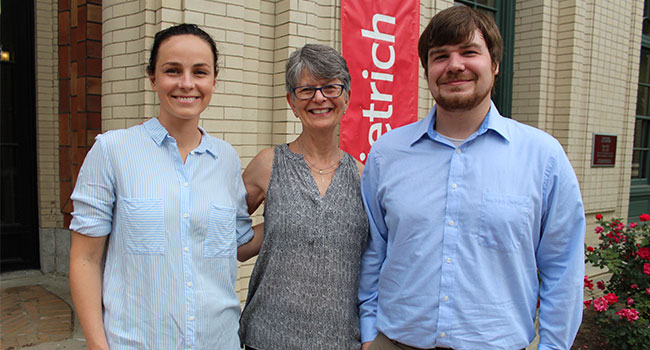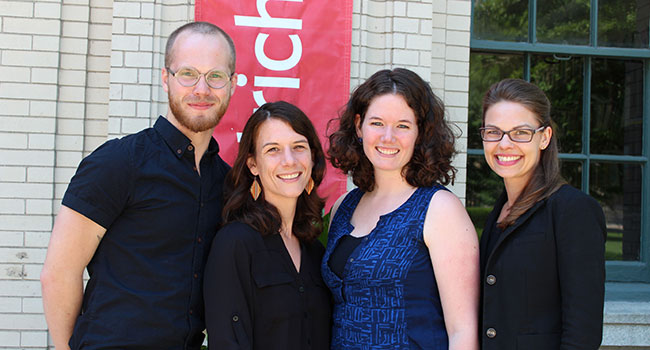LCS, Rhetoric Programs Present Research at Prestigious Conferences
This past semester, Ph.D. students, alumni and faculty from our Literary and Cultural Studies and Rhetoric Programs presented their research at highly regarded conferences in locations near and far from Pittsburgh to Atlanta.
Two faculty members, three Ph.D. students and one recent Ph.D. alumna from Carnegie Mellon’s Literary and Cultural Studies (LCS) Program presented their research at the The American Society for Eighteenth-Century Studies annual conference, which took place in Pittsburgh from March 21-April 3.

From L-R: Literary and Cultural Studies (LCS) Ph.D. student Jamie Smith, Professor of English Kristina Straub and LCS Ph.D. student Craig Stamm presented their work at The American Society for Eighteenth-Century Studies annual conference.
LCS faculty members who presented their work or served on roundtables at the conference:
- Jon Klancher, “Reading the Technologies: Skill and Scale in British Print Culture 1750–1820”
- Kristina Straub participated on two roundtables: “Not the Usual Suspects” and “Austen in Public”
LCS Ph.D. students who presented their work at the conference:
- Juliann Reineke, “An Officer and a Gentleman: Tom Bowling and the Celebrity 'Sailor'"
- Jamie Smith, “Sacrament, Sacramental, and Subversion: Performances of Catholicism and Gender in Elizabeth Inchbald’s ‘A Simple Story’”
- Craig Stamm, “The Real Dr. Slop"
Recent LCS Ph.D. graduate Kate Hamilton participated on two panels: “Fashioning Fame: Celebrity Studies, Where Have We Been, Where Are We Going?” and “Stage and Page: Celebrity, Theater, and the Eighteenth-Century Novel.”
“It’s a great way to get direct feedback about your work and interact with the scholars who are talking about celebrity and the 18th century,” she said.
LCS Ph.D. student Pierce Williams also attended the event.
Five faculty members, 11 Ph.D. students and three recent Ph.D. alumni from the Rhetoric Program presented their research at the 17th Biennial Rhetoric Society of America Conference from May 26-29 in Atlanta, Georgia.
"The theme of this year's RSA Conference, Rhetoric and Change, provided a great opportunity for Carnegie Mellon's English Department to learn about current research in the field and demonstrate the department's blend of theory and practice in its rhetoric and writing curriculum,” said Assistant Professor of English Doug Coulson.

From L-R: Rhetoric Ph.D. students Ryan Mitchell, Ana Cooke, Maggie Goss and Rhetoric Ph.D. alumna Carolyn Commer recently presented their research at the 17th Biennial Rhetoric Society of America Conference.
Rhetoric faculty members who presented their work or served on roundtables at the conference:
- Doug Coulson, “Quit Calling It Forensic: The Complex Publics of Legal Discourse”
- Barbara Johnstone, “Micromanaging Authority: The Rhetorical Design of Everyday Narrative”
- David Kaufer spoke at the Preconference Retreat on “Leadership in the Academy and the Profession,” co-presented “Hillary Clinton's Political Memoirs: Changes in Rhetorical Registers and Styles,” and served on the roundtable, “Confronting the Myths and Realities of the Academic Career: The Role of the RSA in Enhancing Career and Community”
- Thomas Mitchell, “Evaluating Encounters with Authority"
- John Oddo, “Propaganda as an Intertextual Phenomenon”
Rhetoric Ph.D. students who discussed their research on panels at the conference:
- Amanda Berardi Tennant, “Rural Identity in the Writing Classroom: A Study of First-Year Students from the Appalachian Region at Carnegie Mellon University”
- Ana Cooke served on two roundtables: “How to Do (Rhetorical) Things with Networks” and “Revolutions in Rhetoric and Writing: Transdisciplinary Approaches to the Death of the Academic Essay” and gave one presentation: “Divergent Enactments: How Genre Structures Unfold Diachronically in Online Global Warming Articles”
- Emily Ferris, "Public Mourning: The DSM-5 Bereavement Exclusion Controversy at the Intersection of Definition, Classification, and Argument Spheres"
- Mary Glavan, “Negotiating Abled Privilege in the Field: Disability and Rhetorical Ethnography”
- Maggie Goss, “The Construction of International Publics and Epideictic Functions in Hillary Clinton’s Benghazi Testimony”
- Derek Handley, “The Citizen and Social Action: Leadership Seminars as Rhetorical Education during the Long Civil Rights Movement" and “Blight into Blossom: Myth, Identifications, and the Narrative of Urban Renewal"
- Jessica Harrell, “Voices in the Crowd: Oral Histories and Public Remembering”
- Alex Helberg, “The Rhetoric of Regression: Neoliberal Political Speech and the Construction of a National Deictic Center”
- Justin Mando, “Vicarious Experiences of Proximity: Image Repair in Shale Gas Public Hearings”
- Ryan Mitchell, “The Emergence of a Post-AIDS Gay Ethic: Social, Medical, and Political Arguments for a New Sexual Policy in the Gay Community”
- Will Penman, “Mobility to Exit the Field: White Privilege Undermining Interracial Dialogue” and “’Close Reading’: Negotiating Affect and Commitment in Pursuit of Social Change”
Recent Rhetoric Ph.D. alumni who presented their work at the conference:
- Carolyn Commer, "Market Talk as Political Style: The Spellings Commission and the Future of Higher Education Policy"
- Ari Klein, "Becoming the Chairman of the United States Federal Reserve: Changes in Social Identity and Speech"
- Kristin Shimmin, "Rhetorical Archives for Extending History of Science's Focus on Circulation,” “Changing History of Science’s Approach to The History of Jamaica (1774): Rhetorical Methods for Nuancing Histories of Racial Science,” and participated on the first and second sessions of the roundtable, “Research Network: Sharing Work in Progress”
Learn more about our Ph.D. Programs.
__
By Amanda King
Share: